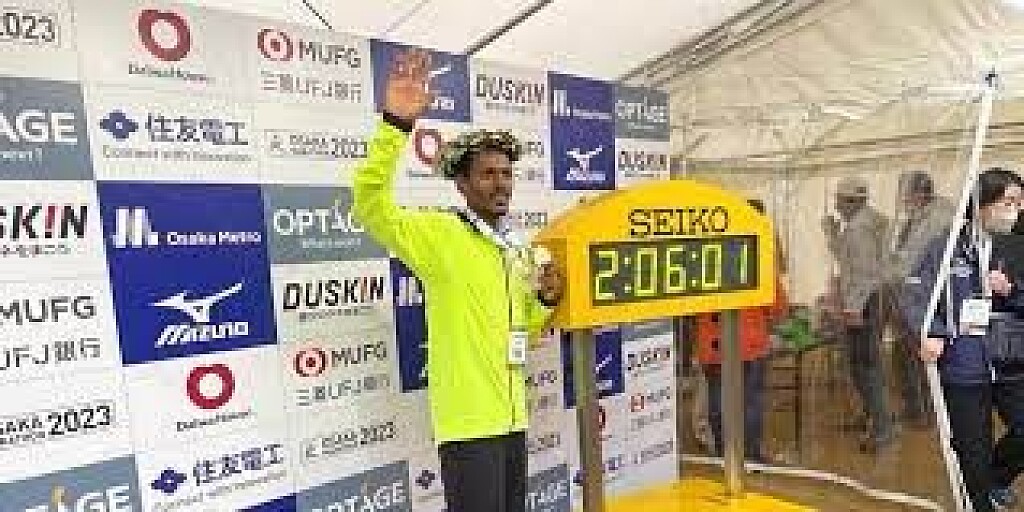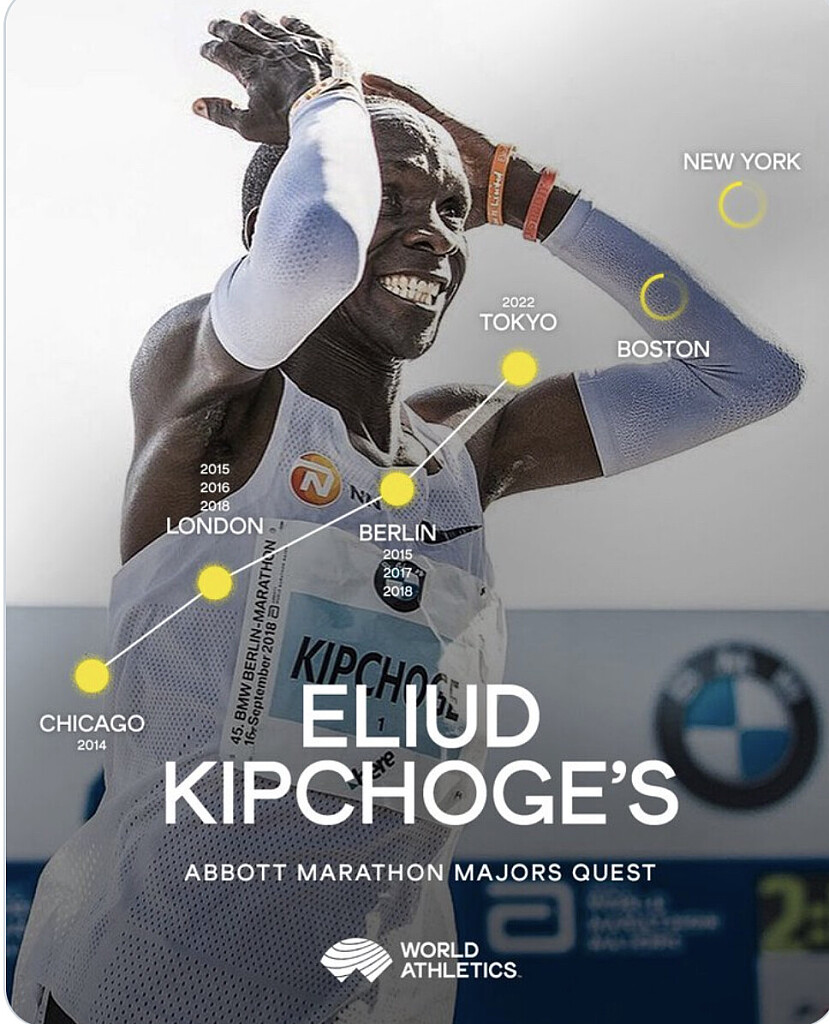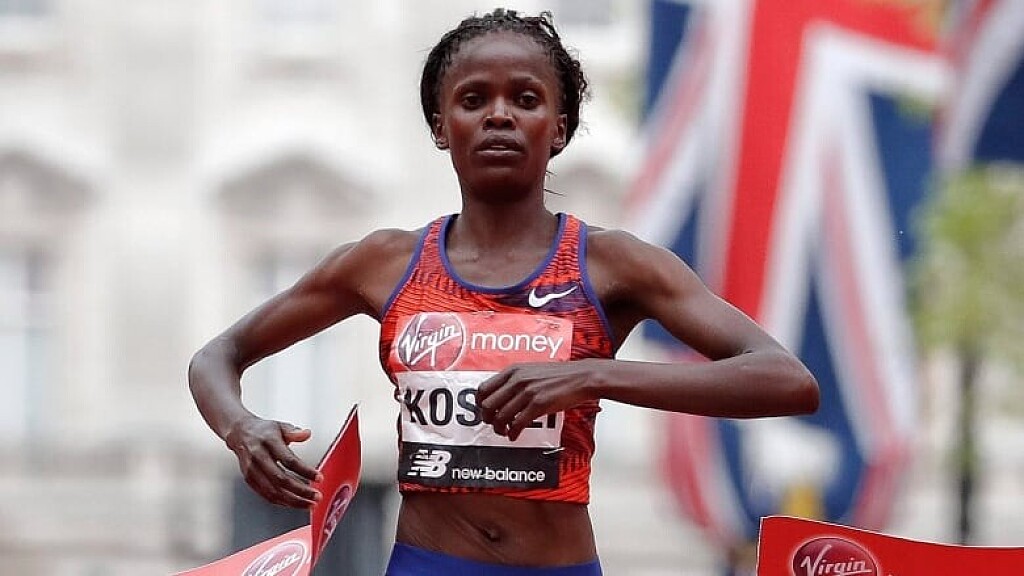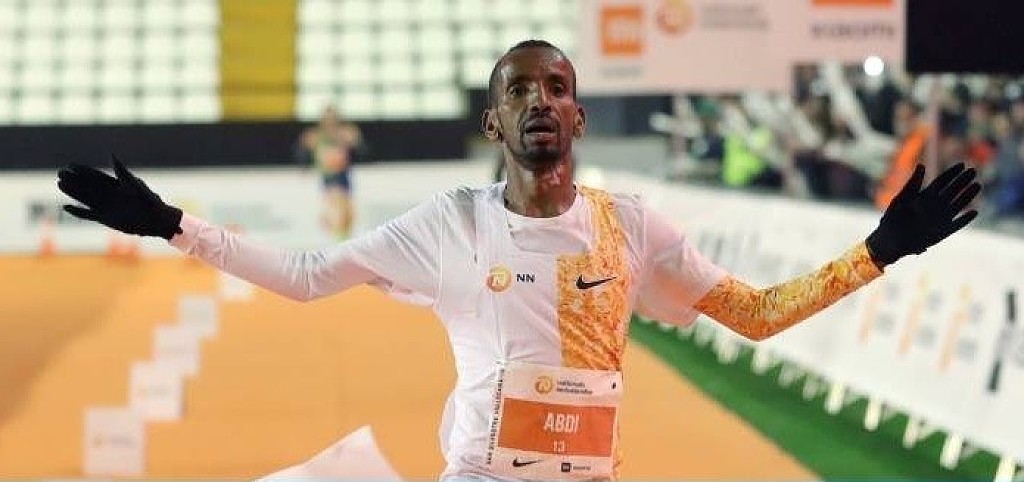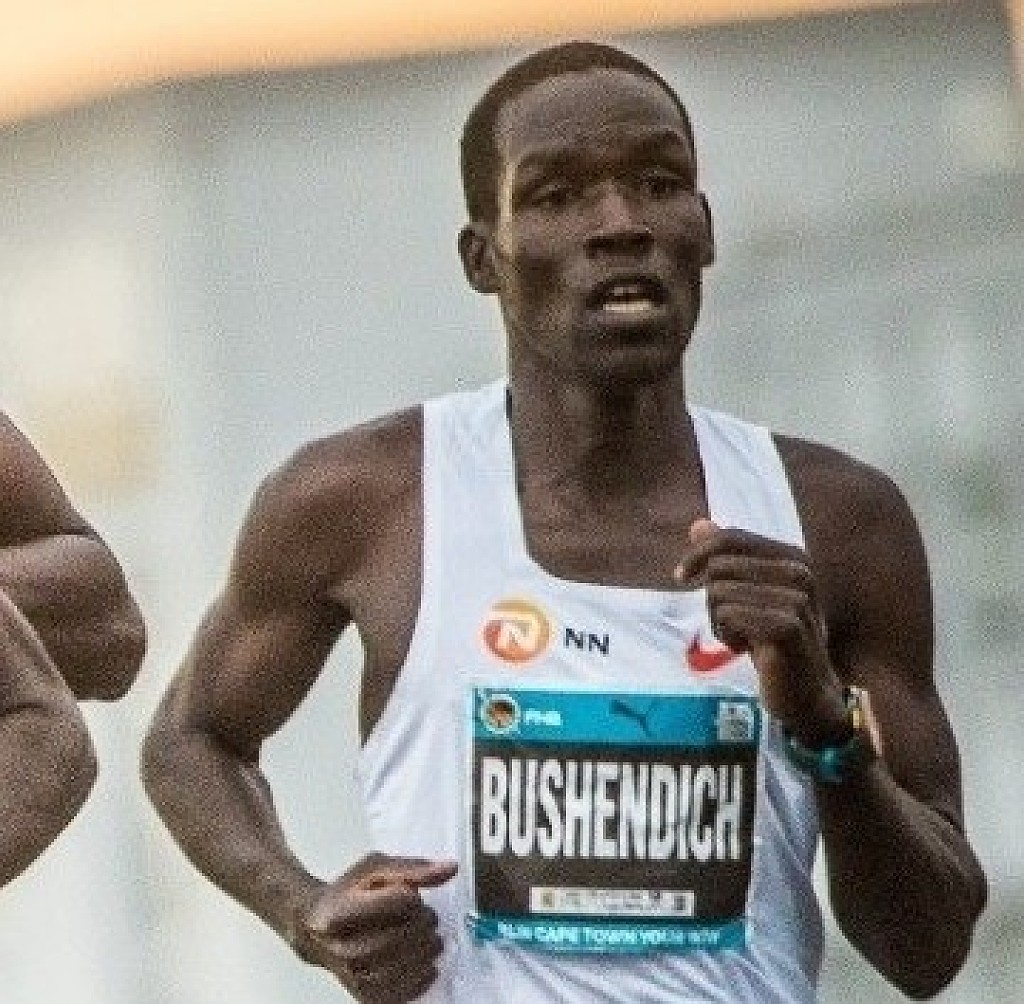Running News Daily
Running News Daily is edited by Bob Anderson. Send your news items to bob@mybestruns.com Advertising opportunities available. Train the Kenyan Way at KATA Kenya and Portugal owned and operated by Bob Anderson. Be sure to catch our movie A Long Run the movie KATA Running Camps and KATA Potato Farms - 31 now open in Kenya! https://kata.ke/
Index to Daily Posts · Sign Up For Updates · Run The World Feed
Articles tagged #Helen Bekele
Today's Running News
A Record-Breaking Day at the Osaka Marathon
With five 180˚ turnaround points and serious hills in its last 12 km the Osaka Marathon course isn't the fastest around, but that didn't hold back record-breaking runs in both the women's and men's races. Great conditions, 5˚~7˚C, light clouds and very light winds definitely helped.
The women's race went steadily on 2:22 pace, an early group of six shaking down to just four, Japan's Momoko Watanabe (Tenmaya), favorite Vivian Kiplagat (Kenya) and Ethiopian duo Helen Bekele Tola and Beyenu Degefa, by 30 km with Australian a few seconds behind. Bekele made the winning break, pulling away to win in a course record 2:22:16. Watanabe, who came into the race with a best of only 2:30:42 PB, led Degefa in the home straight but lost out in the last kick. Degefa was 2nd in 2:23:07 and Watanabe 2:23:08 for 3rd, clearing the 2:24:00 auto-qualifying standard for MGC Race Olympic marathon trials qualification.
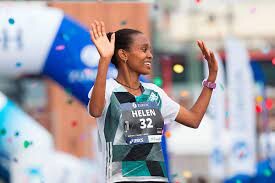
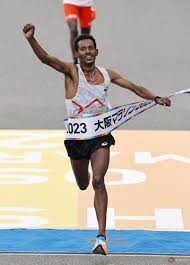
Only getting faster with age, the 43-year-old Weightman ran Kiplagat down for 4th in 2:23:15, beating her PB from last fall's Berlin Marathon by 45 seconds. Weightman is also entered to run next weekend's Tokyo Marathon. Misaki Nishida (Edion) and Yuri Karasawa (Kyudenko) also caught Kiplagat, Nishida taking 5th in a PB 2:25:51 to qualify for the Olympic trials and Karasawa running 2:27:27 in her debut but missing qualification by 27 seconds. The pre-race favorite, Kiplagat fell to 7th in 2:28:44.
The shinkansen effect was in full effect in the equally well-paced men's race, a quartet led by Tomoki Ota (Toyota) running with almost zero variation through 25 km in 1:15:00 and pulling along a pack of almost 50. After Ota stopped at 25 km the pacing over the next 5 km was a bit shakier, but after hitting 30 km in 1:30:13 and the remaining pacers dropping out Eritrean Merhawi Kesete initiated a series of attacks that saw six different athletes take the lead over the hilliest section of the course. Among them was former Toyo University Hakone Ekiden star Kazuya Nishiyama (Toyota), who made moves to the front twice while on 2:06 pace in his debut.
With 5 km to go Ugandan Victor Kiplangat threw off his hat and surged, pulling South African Stephen Mokoka, Tanzanian Alphonce Felix Simbu and #1-ranked Ethiopian Hailemaryam Kiros with him. Behind them a chase trio of Nishiyama and fellow first-timers Charles Kamau (NTN) and Yohei Ikeda(Kao) congealed, all three of them sub-61 half marathoners and on the cusp of hanging on to a 2:06 debut. Kiplangat, 2:05:09 in Hamburg last fall, did all the work up front, shaking off Mokoka and Simbu but unable to get rid of 2:04:41 man Kiros.
With just 200 m to go Kiros surged, taking the win in a 2:06:01 CR with Kiplangat just 2 seconds back. Simbu was 3rd in 2:06:19, but behind him Kamau closed hard to run down Mokoka for 4th, 2:06:37 in his debut to the veteran Mokoka's 2:06:42. Mokoka had a near-miss on the South African NR, finishing just 9 seconds off Gert Thys' 2:06:33 at the 1999 Tokyo International Marathon.
Both only 24 years old, Nishiyama and the Toshinari Takaoka-coached Ikeda were next in 2:06:45 and 2:06:53, each of them well under the old debut marathon NR of 2:07:31 set by last year's Osaka winner Gaku Hoshi. With Nishiyama having dominated Hakone's First Stage at Toyo and Ikeda having been the top Japanese finisher on its most competitive stage his fourth year the relationship between Hakone success and later marathon performance is clearer than ever. 2021 Olympic team alternate Shohei Otsuka (Kyudenko), another Hakone stage winner, closed hard to take 8th in 2:06:57 and make it three Japanese men under 2:07.
Already qualified for the Olympic marathon trials after a 2:11:41 debut for 2nd at August's Hokkaido Marathon, Yugo Kashiwa (Toyo Univ.) ran the 2nd-fastest collegiate time ever, 2:08:11, for 20th. Like Mokoka, Mongolian Jamsran Olonbayar came painfully short of the Mongolian NR, missing Ser-Od Bat-Ochir's 2:08:50 record by just 8 seconds at 2:08:58 for 29th. Tokyo Olympian Yuma Hattori (Toyota) had his best race since the 2019 trials, finishing 34th in 2:09:47, but will have to try again before the end-of-May deadline to hit a trials qualifier. Further back, visually-impaired T11 WR holder Shinya Wada broke his own best with a new world record of 2:24:29.
Including Nishiyama and Ikeda a total of nine men qualified for October's MGC Race Olympic marathon trials, along with Watanabe and Nishida in the women's race. The top 18 went under 2:08 and top 29 under 2:09, both bettering the numbers at the legendary 2021 Lake Biwa Marathon where 15 men were sub-2:08 and 28 sub-2:09. But this year's Osaka came up short of Lake Biwa's depth further down, with only 35 men sub-2:10 versus 42 at Lake Biwa. But with over 50 men on the entry list at Tokyo next week having run sub-2:10 in the last three years the stage is set for something even wilder there.
by Brett Larner, Japan Running News
Login to leave a comment
Osaka Marathon
Let’s run for fun in the shadow of Osaka Castle, the symbol of the city!This is a fun running event, which welcomes international runners from all corners of the global alongside families, friends and Japanese runners; all running together through the colored leaves of Osaka Castle Park on a crisp autumn morning. The fun and pleasure of running is universal! ...
more...Kipchoge and Kosgei race to Japanese all-comers' records in Tokyo
World record-holders Eliud Kipchoge and Brigid Kosgei recorded another two of the fastest marathons of all time in Tokyo on Sunday (6), running 2:02:40 and 2:16:02 respectively on their return to Japan.
Back in the country where they claimed their respective Olympic gold and silver medals seven months ago, they both used their great experience to leave their rivals behind in the closing kilometres and break the Japanese all-comers' records in the Tokyo Marathon, the first World Athletics Elite Platinum Label road race of the 2022 calendar.
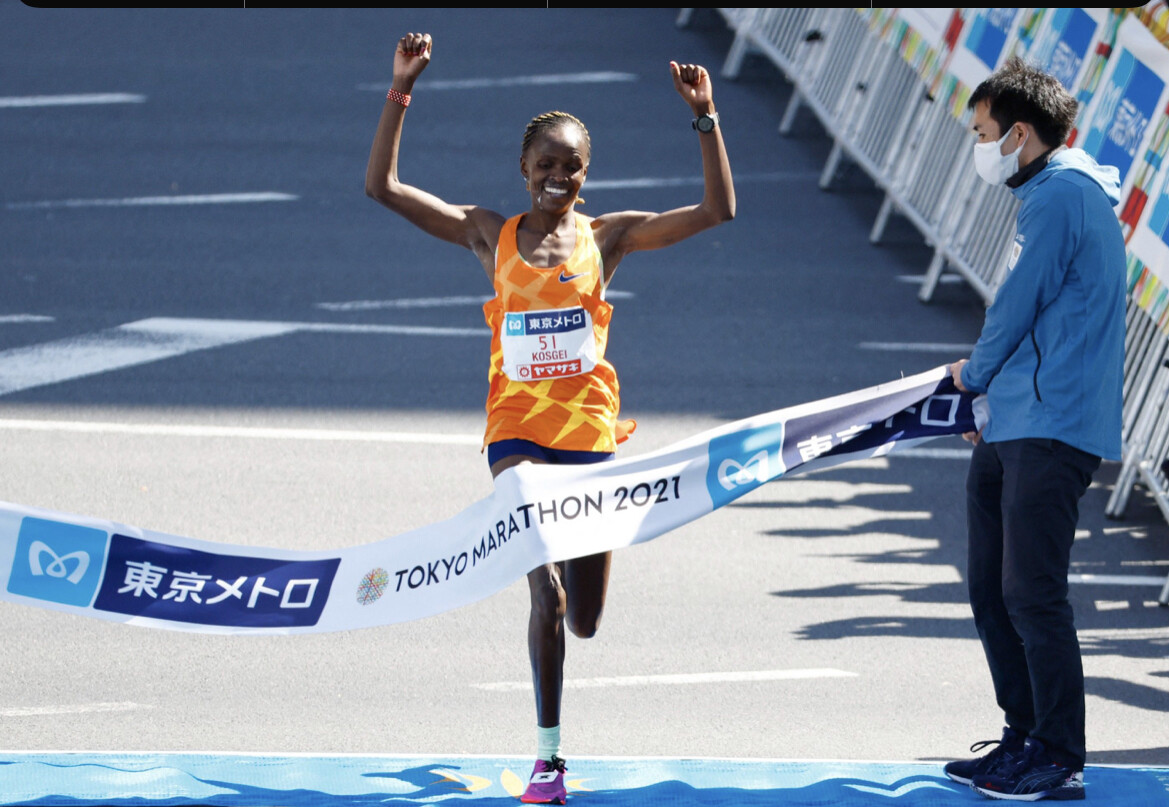
Kipchoge’s performance is the fourth-best ever behind his own world record of 2:01:39 set in Berlin in 2018, while Kosgei’s is a time that only she with her world record of 2:14:04 from Chicago in 2019 and Paula Radcliffe with her 2:15:25 from London in 2003 have ever beaten.
Kenya’s world bronze medallist Amos Kipruto had remained with Kipchoge until 36km and continued running solo to a PB of 2:03:13 in second, while Ethiopia’s Olympic and world medallist Tamirat Tola was third in the men's race in 2:04:14.
In the women’s race, Ethiopia’s 2019 Berlin Marathon winner Ashete Bekere was runner-up this time in a PB of 2:17:58, while another winner in Berlin – 2021 champion Gotytom Gebreslase – was third, 20 seconds behind her compatriot, in a PB of 2:18:18.
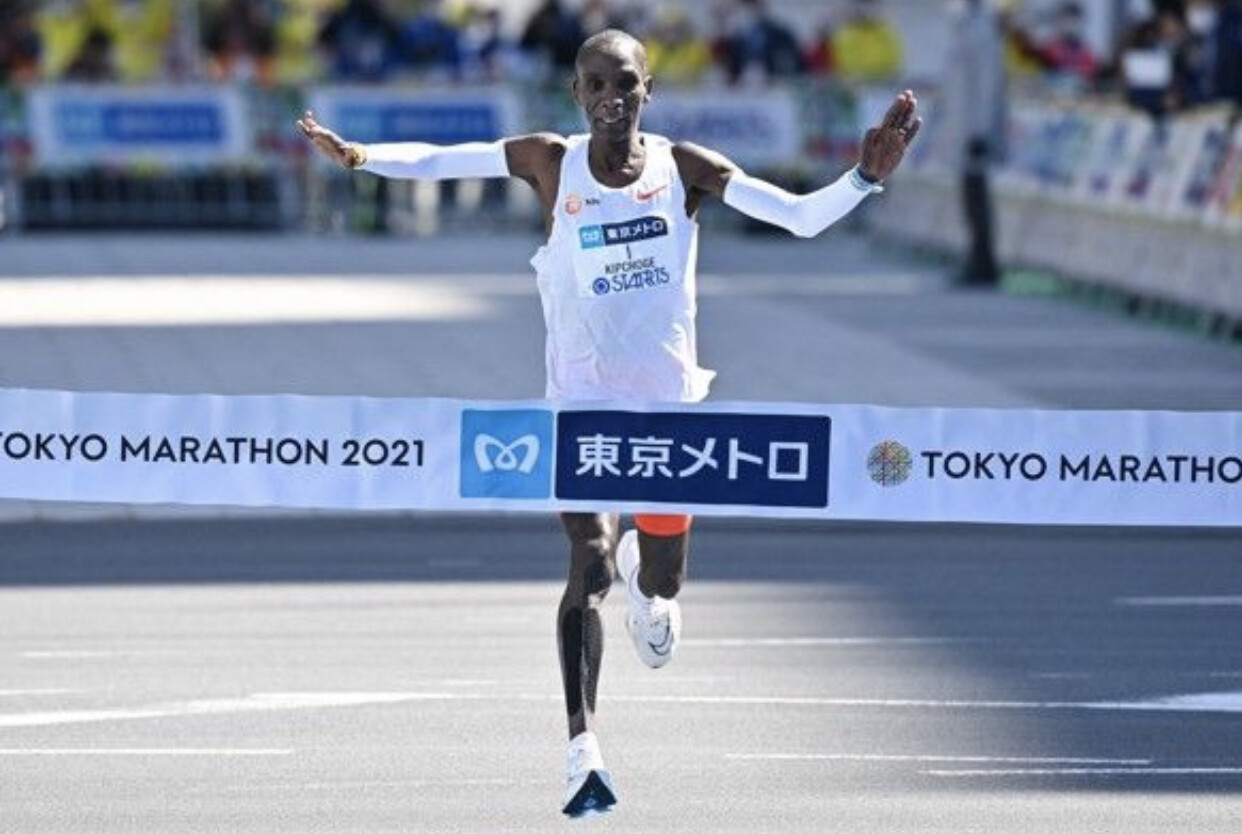
Although missing his targeted own Japanese record, Kengo Suzuki had another strong performance, running 2:05:28 to finish fourth as 22 athletes went sub-2:09. A total of 50 runners, including 43 Japanese athletes, dipped under 2:15, while in the women’s race the top five went sub-2:20, 13 went under 2:30 and Mao Ichiyama with 2:21:02 in sixth led the list of 13 Japanese athletes to go sub-2:40 on a sunny and cool morning.
Despite all he has achieved in the sport so far, marathon great Kipchoge has set himself another aim of winning each of the six Abbott World Marathon Majors. After four London wins, three Berlin victories and one Chicago triumph, he added Tokyo to the list on Sunday and will now aim for Boston and New York City at some point in the future to compete the set.
With his winning time in Tokyo, Kipchoge also extended his list of all-comers’ records, having now run the fastest ever marathons on German, British and Japanese soil with some of those majors wins. Only he with his world record and 2:02:37 run in London in 2019, plus Ethiopia’s Kenenisa Bekele with 2:01:41 in Berlin in 2019, have ever gone faster than the Kenyan’s winning time in Japan’s capital.
The race had been fast from the start and the leaders – with Kipchoge in control at the front of the pack behind the pacemakers – were well under world record pace as they passed 5km in 14:17. That pointed to a predicted 2:00:13 finishing time, but one based on a first 5km featuring a substantial downhill. At 10km the clock showed 28:37, with Ethiopia’s Shura Kitata dropped by that point, the 2020 London Marathon winner having struggled to keep in touch from 8km. A course mishap that saw runners go slightly off track just after 10km gave Kitata the chance to close the gap but he was soon dropped again from a lead group that featured Kipchoge, Kipruto and Tola, together with Ethiopia’s world silver medallist Mosinet Geremew and Kenya’s Jonathan Korir.
That five-strong pack remained together through 15km in 43:16, 20km in 57:53 and half way in 1:01:03, with the world record looking less of a target.
Geremew had been right on Kipchoge’s shoulder up to that point but he dropped back slightly at around 23km and one kilometre later the world silver medallist – who sits fourth on the world marathon all-time list with the 2:02:55 he ran in London in 2019 – pulled up and started to walk, with his hands on his head.
When the final pacemaker stopped at 27km, Kipchoge continued to push ahead and the race was down to three: Kipchoge, Kipruto and Tola, who started to lose touch 2km later. Kipchoge led through 30km in 2:02:09 and at this point a determined Suzuki had caught Kitata and was a couple of minutes behind the leaders.
Kipchoge and Kipruto were side-by-side through 35km in 1:41:30 and then Kipchoge began to make his move. He was a stride ahead at 36km and that increased to around five seconds over the next kilometre as the athletes made a turn and began running into a headwind. But he hung on to record the fastest marathon ever run in Japan by over a minute and claim a 33-second victory.
“I am really happy,” said two-time Olympic marathon winner Kipchoge. “I am excited to be here in Japan, especially after winning the Olympic Games in Sapporo. I really appreciated the crowd.”
Before the race Kipchoge had written 'ST:RO:NG' instead of numbers on his finish time prediction card and the 37-year-old felt he had achieved his aim.
“I said I wanted to run strong in Japan and I did, I ran a course record,” he said. “I am really happy I won another major marathon.”
Kosgei, too, has multiple major marathon wins to her name, having triumphed twice in London and twice in Chicago. After securing silver at the Olympics behind her compatriot Peres Jepchirchir, she finished fourth in London just two months later but was back on top in Tokyo.
The women's race record had been held by Lonah Chemtai Salpeter with the 2:17:45 she set on a slightly different course in 2020 and that time always looked under threat. The leaders were on 2:15:44 pace for the first downhill 5km and then passed 10km in 32:14.
By that point, Kosgei was running as part of a larger mixed group along with fellow women’s race leaders Gebreslase and Bekere, plus Kenya’s Angela Tanui and Ethiopia’s Hiwot Gebrekidan. A chase group featuring Ichiyama and her compatriot Hitomi Niiya, who won the first Tokyo Marathon in 2007, plus Ethiopia’s Helen Bekele and the USA’s 2020 London Marathon runner-up Sara Hall was 30 seconds back.
The same group of five led through 15km in 48:21 and reached half way in 1:08:06. At 25km, passed by the leaders in 1:20:48, chase group athletes Ichiyama and Hall remained on national record pace but those aims began to move out of reach a short while later.
Kosgei was still in control with Gebreslase tracking her, and the pair had broken away by 35km, with 1:53:08 on the clock. Kosgei missed her drink at that point but she didn’t seem to mind as she forged ahead while Gebreslase dropped off the pace. Kosgei had broken away by 37km and went on unchallenged to record another magnificent mark.
Bekere – who ran 2:18:18 when finishing third at last year’s London Marathon – came through to claim the runner’s up spot and improve her PB by 20 seconds while Gebreslase also had the run of her life to match her compatriot’s former PB of 2:18:18, building on her 2:20:09 debut performance in Berlin.
Tanui was fourth in 2:18:42 and Gebrekidan fifth in 2:19:10, while Ichiyama secured sixth in 2:21:02, Niiya seventh in 2:21:17 and Hall eighth in 2:22:56.
With their respective 2:05:28 and 2:21:02 performances, Suzuki and Ichiyama achieved a combined time of 4:26:30 – the fastest recorded combined result for a married couple running in the same race.
Before the race, Kosgei had said her target time was “a secret” and although she went on to record the third-fastest ever women's marathon, she later explained how she felt the wind in the latter stages of the race had prevented her from again attacking 2:14.
by World Athletics
Login to leave a comment
Tokyo Marathon
The Tokyo Marathon is a world-renowned annual marathon held in Tokyo, Japan. As one of the prestigious Abbott World Marathon Majors, it attracts elite and amateur runners from around the globe. The race holds World Athletics Platinum Label status, recognizing its high competitive standards, top-tier organization, and international appeal. Sponsored by Tokyo Metro, the Tokyo Marathon has grown into one...
more...2022 Tokyo Marathon Women's Preview
The women’s race at the 2022 Tokyo Marathon has a little something for everyone. There’s Brigid Kosgei, the Kenyan world record holder attempting to reassert herself as the world’s best marathoner after Peres Jepchirchir claimed that title in 2021.
There’s Angela Tanui, the breakout star who won three marathons last year, capped by a 2:17:57 course record in Amsterdam. And for American fans, there’s Sara Hall, fresh off setting a US half marathon record in Houston in January and ready to mix it up with the best in the world on a flat, fast course.
Women Elite Entries:
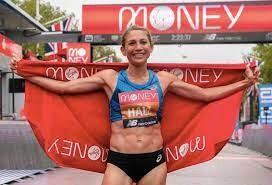
Brigid Kosgei (Kenya) – 2:14:04 (Chicago 2019)
Angela Tanui (Kenya) – 2:17:57 (Amsterdam 2021)
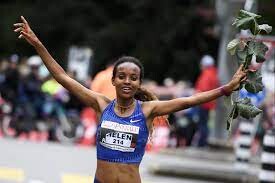
Ashete Bekere (Ethiopia) – 2:18:18 (London 2021)
Hiwot Gebrekidan (Ethiopia) – 2:19:35 (Milan 2021)
Gotytom Gebreslase (Ethiopia) – 2:20:09 (Berlin 2021)
Mao Ichiyama (Wacoal) – 2:20:29 (Nagoya 2020)
Sara Hall (U.S.A.) – 2:20:32 (Marathon Project 2020)
Helen Bekele (Ethiopia) – 2:21:01 (Tokyo 2019)
Natsuki Omori (Daihatsu) – 2:28:38 (Nagoya 2021)
Shiho Kaneshige (GRlab Kanto) – 2:28:51 (Osaka Int’l 2020)
Hitomi Niiya (Sekisui Kagaku) – 2:30:58 (Nagoya 2009)
Miharu Shimokado (SID Group) – 2:32:48 (Osaka Int’l 2020)
Yui Okada (Otsuka Seiyaku) – 2:32:00 (Nagoya 2020)
Hitomi Mizuguchi (Uniqlo) – 2:32:33 (Osaka Int’l 2020)
Mai Fujisawa (Hokkaido Excel AC) – 2:35:52 (Kanazawa 2021)
Tomomi Sawahata (Sawahatters) – 2:36:45 (Osaka Int’l 2022)
Debut / Do-Over
Kaori Morita (Panasonic) – 1:10:28 (Nat’l Corp. Half 2021)
Rika Kaseda (Daihatsu) – 31:39.86 (Nat’l Championships 2020).
Can Brigid Kosgei Return to the Top?
From the fall of 2018 through the fall of 2020 — four marathon cycles — Brigid Kosgei was the best marathoner in the world. By the end of that stretch, the gap between Kosgei and everyone else was not close. Her 2:14:04 in Chicago in 2019 was 81 seconds faster than Paula Radcliffe‘s previous world record and almost three minutes faster than any active marathoner had ever run. In her next race, 2020 London, she ran 2:18:58 in miserable conditions on a day when none of the rest of the world’s best marathoners could crack 2:22. She was in her own marathon galaxy.
Last year, however, Kosgei came back to Earth. That’s usually what happens when someone becomes World #1 in the fickle event that is the marathon (well, unless your name is Eliud Kipchoge). Kosgei was far from ordinary in 2021 — she still claimed second at the Olympics and fourth in London (in 2:18:40) just eight weeks later — but she was not the all-conquering giant of the previous three years. By the end of last year, the discussion about the world’s greatest female marathoner featured two women, and Kosgei wasn’t among them (right now it’s Olympic/NYC champ Peres Jepchirchir or London champ Joyciline Jepkosgei, who will race each other next month in Boston).
A win in Tokyo would nudge Kosgei back into that conversation, and she will start as the favorite on Sunday. Remember, after that dominant stretch from 2018-20, talk was starting to heat up that Kosgei could be the best marathoner the world has ever seen. That’s the trajectory she was on, and she only just turned 28 years old. If she can return to that sort of form, she’ll be your champion in Tokyo.
The Other Women Who Could Win
The top challenger to Kosgei in Tokyo is Angel Tanui, who emerged from relative obscurity to become one of the world’s top marathoners in 2021. Tanui, now 29, began last year as a serviceable road runner with pbs of 31:51/67:16/2:25:18 but wound up winning marathons in Dhaka (Bangladesh), Tuscany, and Amsterdam and finish as LetsRun’s third-ranked marathoner in the world. Tanui was only in Amsterdam because visa issues had prevented her from running Boston the previous week, but it certainly didn’t affect her race as she ran 2:17:57 to smash the course record. 2:17 doesn’t mean what it used to — these days, it’s barely fast enough to rank in the top 10 all-time — but it’s still plenty quick and signals Tanui as a major player.
Another woman to watch on Sunday is Ethiopia’s Ashete Bekere. She was only 7th in her last visit to Tokyo in 2016, but since then she’s won big-time races in Valencia (2018), Rotterdam (2019), and Berlin (2019). In her last marathon, she ran a pb of 2:18:18 to finish third in London, defeating Kosgei in the process (though Kosgei was just eight weeks removed from the Olympics). Clearly, Bekere has what it takes to win a major.
The other two notables in the field outside of Sara Hall — we’ll get to her in a minute — are the women who went 1-2 in Berlin last fall. Berlin was one of the weaker majors in 2021, but it was hard not to be impressed by Ethiopia’s Gotytom Gebreslase, who won the race convincingly in her debut in 2:20:09. Gebreslase is coached by the famed Haji Adilo, and he told Women’s Running he’s been impressed by what he’s seen recently:
“[Gebreslase] has even made big advancements in her training since Berlin,” Adilo says. “She set a personal best in the half marathon in December [1:05:36 in Bahrain], and if the weather and conditions are good in Tokyo, she could do something very special there.”
The runner-up behind Gebreslase in Berlin, Hiwot Gebrekidan, also had a good year in 2021 as she ran a pb of 2:19:35 to win Milan in May. But against this Tokyo field, 2:19 may not be good enough to challenge for the win.
Sara Hall Chases a Fast Time
Sara Hall running Tokyo is something we don’t get often: one of America’s top marathoners racing against the best in the world in a fast international marathon. Last month, Molly Seidel told Track & Field News that American pros “are gonna get our asses handed to us nine times outta ten, if the course is fast.”
by Jonathan Gault
Login to leave a comment
Tokyo Marathon
The Tokyo Marathon is a world-renowned annual marathon held in Tokyo, Japan. As one of the prestigious Abbott World Marathon Majors, it attracts elite and amateur runners from around the globe. The race holds World Athletics Platinum Label status, recognizing its high competitive standards, top-tier organization, and international appeal. Sponsored by Tokyo Metro, the Tokyo Marathon has grown into one...
more...Belgium’s Bashir Abdi and Ethiopia’s Helen Bekele Tola signed a successful farewell to 2019, taking convincing victories at the 55th San Silvestre Vallecana on Tuesday
Belgium’s Bashir Abdi and Ethiopia’s Helen Bekele Tola signed a successful farewell to 2019, taking convincing victories at the 55th San Silvestre Vallecana, a World Athletics Gold Label road race.
While Bashir got the better of Uganda’s Mande Bushendich in 27:47, Tola beat Kenya’s world marathon champion Ruth Chepngetich by seven seconds, winning in 30:50. The downhill nature of the course means times achieved here are not valid for PB or record purposes.
On a pleasant windless night with the thermometer reaching 9C, the race kicked off at a moderate pace as a 10-man pack covered the opening kilometer in 2:48. Spain’s Toni Abadía moved to the front and opened a 30-meter gap by the second kilometer; shortly afterwards Jesús Ramos joined Abadía in the lead and the local pair went through three kilometers in 8:04.
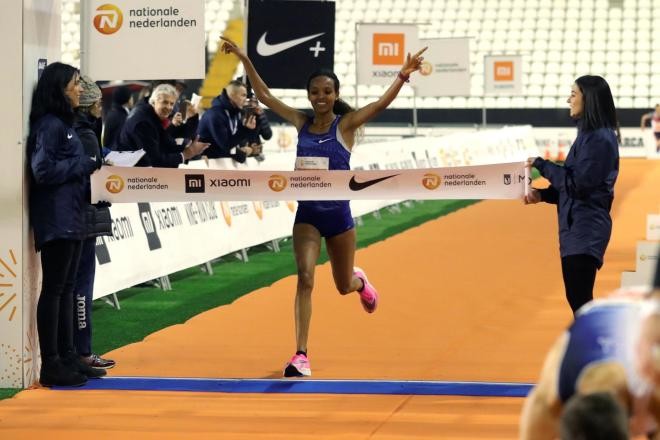
The main favorites were about 40 meters behind, led by Turkey’s Aras Kaya, the Ugandan trio of Moses Kurong, Boniface Sikowo and last year’s third-place finisher Bushendich plus Bashir Abdi.
The Spaniards’ lead was to be short lived and before reaching the halfway point (13:30) they were caught by the chasing group with Kurong making most of the pacing duties. The key movement came with the clock reading 19:00 when Abdi broke away from the heading pack to build a two-second advantage on Bushendich and five over Abadía with 2.5km to go.
Abdi, the European 10,000m silver medalist, who had remained in the middle of the leading group for the first half of the race, proved to be in fine form over the tough final stages. At the tape, the Belgian was timed at 27:47, his first ever sub-28-minute clocking on the roads, while Bushendich finished in 27:51. Abadía managed the fastest ever time by a Spaniard here with 27:56, some consolation for recording his fourth third-place finish in Madrid.
“After competing at the Chicago Marathon (where he set a Belgian record of 2:06:14), I rested for several weeks but then I resumed training and I felt good today,” said Abdi, who was born in Somalia but fled the country at the age of 12. “The closing two kilometers were very tough but I reserved my energy in the first half and the tactic paid off.
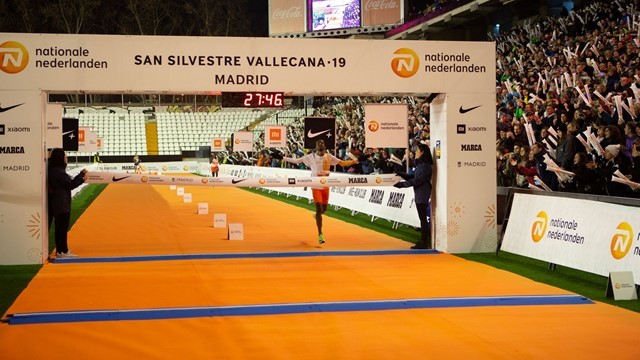
“This year I have broken the Belgian record twice (2:07:03 in London and 2:06:14 in Chicago) and I would like to get close to the European record (2:04:16) in some of my next outings over the distance,” said Abdi, who will run a half marathon in the Netherlands on 12 January before contesting the Tokyo Marathon in March. “I would like to compete at the Tokyo Olympics, but also understand the decision to move the road events venue to Sapporo due to the weather conditions.”
The anticipated clash between Kenya’s world marathon champion Ruth Chepngetich and Ethiopia’s Helen Bekele Tola didn’t disappoint.
Sandwiched between a large pack of men, the two women were evenly matched for the first three kilometers which they covered in 8:56, clearly ahead of Portugal’s Carla Salomé Rocha (9:20) and Uganda’s late addition to the field Juliet Chekwel (9:24),
Chepngetich, who had declared at the pre-race press conference that she was not yet in the same kind of form which led her to the gold medal in Doha, could not follow in the Ethiopian’s footsteps before reaching halfway (14:50 vs 14:54); by then Rocha kept her four-second margin on the Ugandan (15:29/15:33).
In the second half, 25-year-old Tola managed to extend her lead to eight seconds with about two kilometers to go while Rocha also widened her advantage on Chekwel to another eight seconds.
Tola confirmed her supremacy during the uphill closing section and romped home in 30:50, the fourth fastest time ever recorded at this race. Meanwhile, Rocha completed the podium more than a minute behind the winner (31:52) but 21 seconds clear of Chekwel.
“I have beaten the recent world champion and that’s great for me,” said Tola, who is based in Geneva where she is coached by Tesfaye Eticha. “I feel in great shape and look forward to running under 2:20 in Tokyo in March.”
by World Athletics
Login to leave a comment
San Silvestre Vallecana
Every year on 31st December, since 1964, Madrid stages the most multitudinous athletics event in Spain.Sport and celebration come together in a 10-kilometre race in which fancy dress and artificial snow play a part. Keep an eye out for when registration opens because places run out fast! The event consists of two different competitions: a fun run (participants must be...
more...Ugandan Mande Bushendich and Kenyan Ruth Chepngetich will be the main favorites at the Nationale-Nederlanden San Silvestre Vallecana
The Ugandan Mande Bushendich and the Kenyan Ruth Chepngetich are the main favorites in the Nationale-Nederlanden San Silvestre Vallecana, which takes place on December 31 through the streets of the center of Madrid and that this Monday presents its favorites of the international elite test .
Ugandan Mande Bushendich returns to Vallecas after his third place last year wanting to climb to the top of the podium. In the record race last year he registered 27:24, and this year he has already dropped 28 minutes in Holland, although in the spring, which makes him run as one of the favorites.
Another candidate for the victory will be the Belgian-Somali Bashir Abdi, silver in the Berlin Europeans in 10,000 meters and that 'shattered' the Belgian marathon record a few months ago, with 2h06: 14 in Chicago. Also, Ugandan Moses Kurong, fourth in the Gothenburg Half Marathon 2019 and third in Barcelona in 2018.
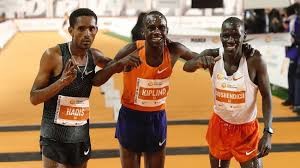
The San Silvestre Vallecana women's will feature the Kenyan Ruth Chepngetich, current marathon world champion in Doha 2019, and victories in the Dubai Marathon and the Istanbul Half Marathon this year. Second in 2018 at the Paris Marathon, Chepngetich will seek to follow the path of his compatriot Brigid Kosgei, who flew last year to set the new test record, with 29:54.
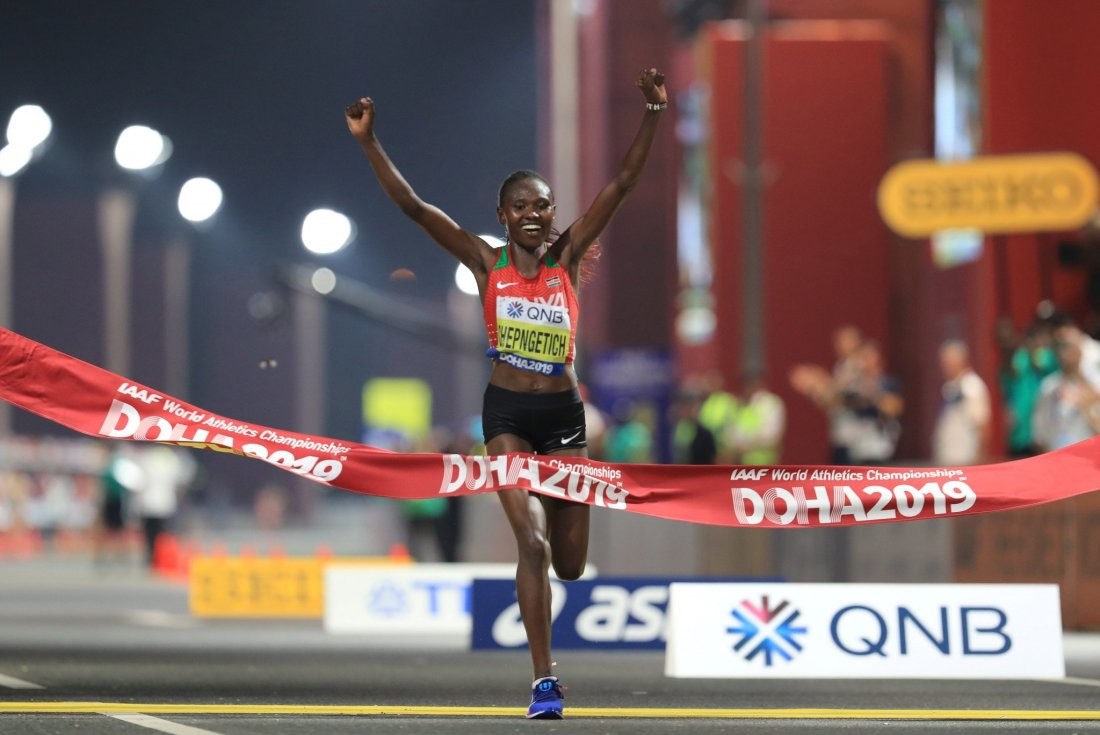
The Ethiopian Helen Bekele Tola is postulated as one of her rivals for victory. Second in the Tokyo Marathon and fourth in Berlin in this 2019, in Spain it has already won in 2017 in the Barcelona Marathon. It has 31:13 as a personal mark in a '10K' en route.
Among the women spain runners, the 23-year-old Carmela Cardama, a university runner of 10,000 meters in the United States and who is the fastest national in the history with her age, beats Alessandra Aguilar.
She was the leader of the Spanish team that won team silver in the 2019 European Cup of 10,000 meters. The San Silvestre Vallecana arrives in great shape, as evidenced by its recent national record in indoor track at 5,000 meters, the tenth best Spanish mark in the distance including outdoors.
by Dani Sanchez
Login to leave a comment
San Silvestre Vallecana
Every year on 31st December, since 1964, Madrid stages the most multitudinous athletics event in Spain.Sport and celebration come together in a 10-kilometre race in which fancy dress and artificial snow play a part. Keep an eye out for when registration opens because places run out fast! The event consists of two different competitions: a fun run (participants must be...
more...

